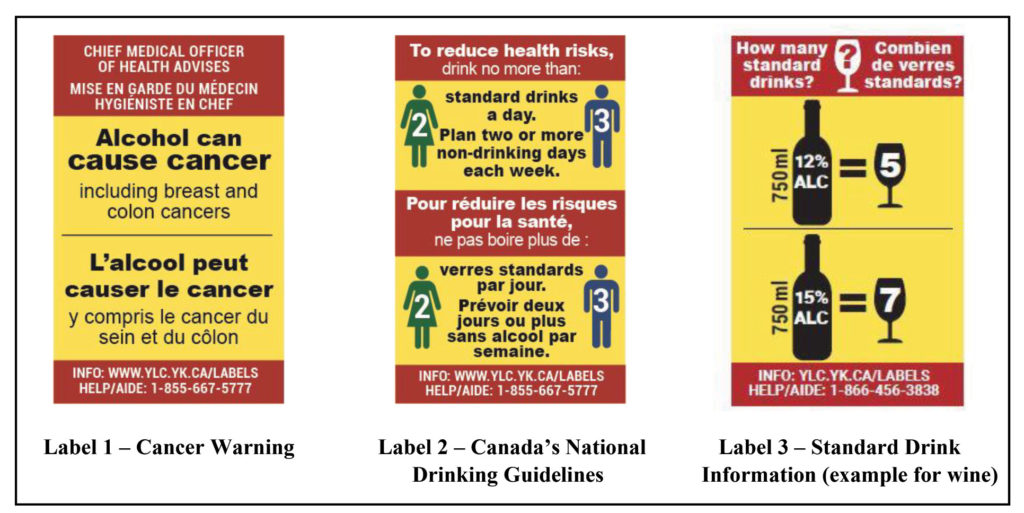Labels on Alcohol Bottles Increase Awareness of Alcohol Harms, Guidelines
Research news
Summary
A series of journal articles published on the Journal of Studies on Alcohol and Drugs (Volume 81, Issue 2) in March support that when alcohol bottles come with conspicuous labels providing information on the risks of alcohol consumption or alcohol use guidelines, people are better informed about alcohol’s harms and may cut down their alcohol use.
Key results from the studies are as follows:
- Large, bright yellow alcohol labels with rotating health messages get noticed by consumers and can increase awareness of national drinking guidelines, improve knowledge of alcohol-related health risks, such as cancer, and reduce alcohol sales compared to control sites without the labels.
- Such labels to alcohol bottles (300,000 labels in all) decreased total sales of alcohol by 6.9% compared with sales in regions without the new labels (Zhao et al. 2020).
- Awareness of Canada’s low-risk drinking guidelines increased nearly three times in the site in which the labels were placed compared with a control location (Schoueri-Mychasiw et al. 2020).
- Before the label intervention, only about 25% of participants knew alcohol consumption can cause cancer. After the labeling, awareness in Yukon rose to 42%, a 10% greater increase in awareness of the alcohol-cancer link relative to the control site in neighboring Northwest Territories (Hobin et al. 2020).

In the Yukon study conducted by Hobin and colleagues, the study was cut short because the alcohol industry protested about the placement of labels on their products. The industry complained that the Yukon Government, who helped coordinate the study and is responsible for alcohol distribution and sales in the territory, did not have legal authority to place such labels, that the labels violated industry’s freedom of expression and that the government was defaming alcohol manufacturers.
Under pressure, the Yukon Government shut down the cancer label research in December 2017, only one month after the study’s launch.
After consultation with legal experts, Stockwell and colleagues concluded, “none of the industry’s claims had any merit.” In fact, they note that provincial and territorial governments in Canada could be held liable if they do not warn consumers about the link between alcohol and cancer. (The World Health Organization declared alcohol as a human carcinogen more than 30 years ago.)
Warning labels help [alcohol users] to be better informed about alcohol’s health risks and prompted many to cut down their [alcohol use],” said Dr. Tim Stockwell, co-lead of the studies, as per, Eureka Alert.
This is an especially vital public health intervention now, as we see people at risk of increasing their alcohol intake as they isolate at home during the COVID-19 outbreak,” he added.
Public health experts call for making effective labeling showing alcohol’s cancer risk and the alcohol use guidelines. Governments need to take action to implement these labels as it is not likely that the alcohol industry would agree to this type of labeling which has proven to reduce consumption of alcohol.
The alcohol industry should warn its customers of the risk of cancer from consuming its product,” said Prof Doug Sellman, a medical spokesperson for Alcohol Action NZ, as per New Zealand Doctor.
…it is highly unlikely that the alcohol industry will voluntarily warn its customers of the risk of cancer, but instead will continue to deny and/or distort the truth about alcohol-related health risks, including cancer risk”.
Large yellow health warnings on alcoholic beverage containers have been shown to be effective in warning consumers of the risk of cancer, and should be made mandatory,” added Prof Sellman.